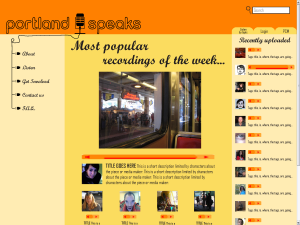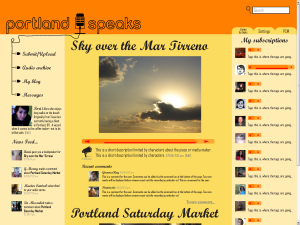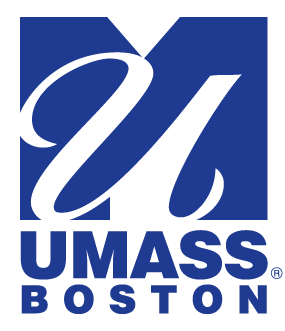Portland Speaks: The genesis of the idea
Categories:
 From July onward, I've spent much of my time at Portland Community Media working on a proposal for a project that would allow immigrants and Millennials to create media at low-cost anywhere and at anytime. To do this, we focused on the cell phone as a media creation device and the Internet as the primary distribution platform with the hope of television as a second one. Here's how the idea began:
From July onward, I've spent much of my time at Portland Community Media working on a proposal for a project that would allow immigrants and Millennials to create media at low-cost anywhere and at anytime. To do this, we focused on the cell phone as a media creation device and the Internet as the primary distribution platform with the hope of television as a second one. Here's how the idea began:
After coming back from Africa, I have a deeper appreciation for the immigrant experience. As a minority, I could only superficially understand the immigrant struggle till my experience as a Peace Corps volunteer in Lesotho. In addition to this, there’s very little ethnic diversity in Portland, and I was curious why, out of the major West Coast cities, it had been excluded from the richness of cultural infusion.
My first day on the job as a CTC Vista, I had a talk with Jason, who managesthe government production side of PCM. I was asking about immigrant representation on PCM channels and programming done by immigrants, of which Jason said there was very little. We talked about the lack of outreach by PCM to immigrant communities in the area even though it’s in line with the mission, and we discussed the need for their presence in community media in Portland.
Having come from print journalism, I have a penchant for paper. Bea, my supervisor, shares this as a bookbinder. We discussed what would be the most comfortable and familiar medium for immigrants. Despite my position as the New Media Vista, I really wanted to bring print into PCM. We decided that, of all forms of media, paper is the most familiar in the world and probably the most comfortable form of communication that anyone can opt for.
Since I was hired on to be the New Media Vista without really understanding what the buzzword of “New Media” and “Web 2.0” were, I was also researching heavily during my first couple of weeks on the job. I read a lot about social media and also came across this website focusing on the phone as an activist tool. It was incredibly interesting for me to learn how phones were being used for flash mobbing and information distribution in third world countries.
At the time, my boyfriend was also about to replace his shitty phone and was intently scouring the Internet for new cell phone technology and customer ratings. I asked him about transferring contacts, SMS’, and other forms of data from his old phone to a new one. I remembered how all my phones used to have a voice memo feature and the short amount of time it allowed for recording. I figured this was anywhere between 1-10 minutes because I used to accidentally hit the voice memo feature on my old cell phone while on calls. I realized how that might be a possibility for new media use for immigrants and thought it might be appropriate technology because of what I saw in Lesotho: Everyone has a cell phone regardless of how remote they are, and a lot of it is driven by the phone as a status symbol. "Everyone" is a bit of an exaggeration, but I later learned that the most familiar and bestselling communicative technology device in the world is the cell phone, which suggests that the phone is at least more familiar than other new communication media.
I started to test the technical side of this idea with phones that belonged to coworkers and friends. The goal was trying to figure out the average amount of time that the memo feature records, and that’s where I discovered that, in fact, not all phones have voice memo features, and phones range in recording time from a minute to whatever amount of memory is left on the phone.
It was around that time that Bea put Jacob and me together on a project to figure out how PCM could address the needs of both immigrant communities and Millennials. PCM has a very hard time retaining Millennials at the facility, and yet they are some of the most media active and social justice oriented people in Portland.
Eventually, I stumbled upon a social networking site called “Utterz,” (now known as Utterli), and although the hope of the voice memo feature was zero-cost media creation, it seemed that a system like Utterli (people dial in to record memos and interviews) was the best compromise between cell phone plans and incongruencies in cell phone features. Utterli, however, is a free form social media site, and Portland Speaks has more of a focus in the form of target groups.
However, following a group brainstorm and dissection, Jacob and I felt  somewhat confused and disillusioned since our parameters were loose and our ideas were being scrambled, so I set out to define the original idea and it burgeoned into the attached proposal and illustrations. It was then decided that the idea would be submitted for the Knight Foundation's News Challenge grant (our application can be found here).
somewhat confused and disillusioned since our parameters were loose and our ideas were being scrambled, so I set out to define the original idea and it burgeoned into the attached proposal and illustrations. It was then decided that the idea would be submitted for the Knight Foundation's News Challenge grant (our application can be found here).
All in all, this has been an incredible learning process with lots of creativity but also some incredibly devastating downs. Welcome to the real world, I guess.
| Attachment | Size |
|---|---|
| Portland Speaks.doc.doc | 96.5 KB |
| website.pdf | 2.36 MB |












Comment from Denise Cheng on November 3, 2008 - 6:50pm
I do want to say that I feel fairly disillusioned after the whole process. You know how they always warn that when the real world hits people lose their idealism? I'd put a twist on that and say I feel disillusioned because of how important credentials are to have creative oversight (the higher you climb, the more you can get) and how, even if you work to deserve a break, there's still that variable of unfairness as the real world standard. A vague comment, but there it is. As my friend put it, we have to make that choice between selfishness and selflessness, each with its own consequences.